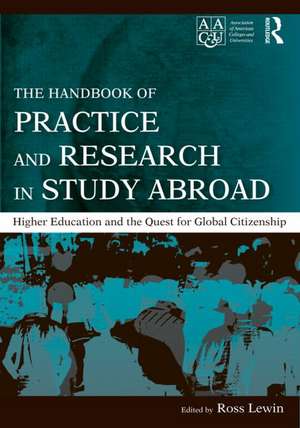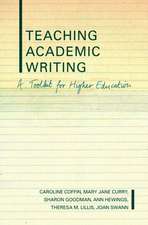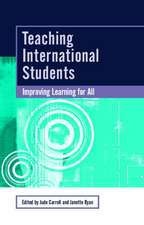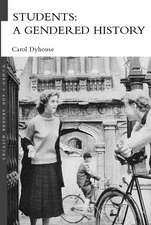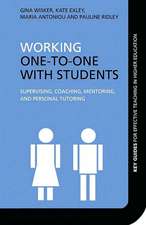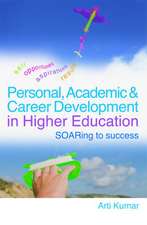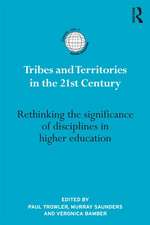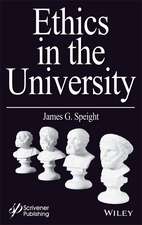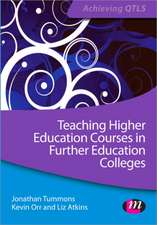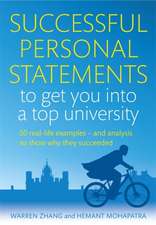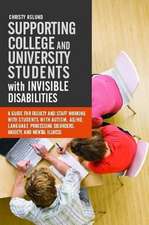The Handbook of Practice and Research in Study Abroad: Higher Education and the Quest for Global Citizenship
Editat de Ross Lewinen Limba Engleză Hardback – 14 mai 2009
If we are all becoming global citizens, what then are our civic responsibilities? Colleges and universities across the United States have responded to this question by making the development of global citizens part of their core mission. A key strategy for realizing this goal is study abroad. After all, there may be no better way for students to acquire the knowledge, skills, and attitudes required to become effective change-agents in international contexts.
The Handbook of Practice and Research in Study Abroad is a comprehensive survey of the field. Each chapter eloquently conveys an enthusiasm for study abroad alongside a critical assessment of the most up-to-date research, theory and practice. This contributed volume brings together expert academics, senior administrators, practitioners of study abroad, and policy makers from across the United States, Canada and other part of the world, who meticulously address the following questions:
What do we mean by global citizenship and global competence?
What are the philosophical, pedagogical and practical challenges facing institutions as they endeavor to create global citizens?
How is study abroad and global citizenship compatible with the role of the academy?
What are the institutional challenges to study abroad, including those related to ethics, infrastructure, finances, accessibility, and quality control?
Which study abroad programs can be called successful?
The Handbook of Practice and Research in Study Abroad is an indispensable reference volume for scholars, higher education faculty, study abroad professionals, policy makers, and the academic libraries that serve these audiences. It is also appropriate for a wide range of courses in Higher Education Master’s and Ph.D. Programs.
| Toate formatele și edițiile | Preț | Express |
|---|---|---|
| Paperback (1) | 607.11 lei 6-8 săpt. | |
| Taylor & Francis – 14 mai 2009 | 607.11 lei 6-8 săpt. | |
| Hardback (1) | 1355.76 lei 6-8 săpt. | |
| Taylor & Francis – 14 mai 2009 | 1355.76 lei 6-8 săpt. |
Preț: 1355.76 lei
Preț vechi: 1653.37 lei
-18% Nou
Puncte Express: 2034
Preț estimativ în valută:
259.51€ • 281.98$ • 218.13£
259.51€ • 281.98$ • 218.13£
Carte tipărită la comandă
Livrare economică 21 aprilie-05 mai
Preluare comenzi: 021 569.72.76
Specificații
ISBN-13: 9780415991605
ISBN-10: 0415991609
Pagini: 608
Ilustrații: 22 b/w images, 27 tables and Following Managing Info (Mutch)
Dimensiuni: 178 x 254 x 33 mm
Greutate: 1.28 kg
Ediția:1
Editura: Taylor & Francis
Colecția Routledge
Locul publicării:Oxford, United Kingdom
ISBN-10: 0415991609
Pagini: 608
Ilustrații: 22 b/w images, 27 tables and Following Managing Info (Mutch)
Dimensiuni: 178 x 254 x 33 mm
Greutate: 1.28 kg
Ediția:1
Editura: Taylor & Francis
Colecția Routledge
Locul publicării:Oxford, United Kingdom
Cuprins
Foreword, Allan Goodman
Acknowledgments
Introduction: The Quest for Global Citizenship through Study Abroad, Ross Lewin
Part One: Defining Global Citizenship in Study Abroad
1. Global Citizenship in Theory and Practice, Hans Schattle
2. Fostering Engagement: The Role of International Education in the Development of Global Civil Society, James Skelly
3. Global Learning and the Making of Citizen Diplomats, Rebecca Hovey and Adam Weinberg
4. International Studies and Foreign Languages: A Critical American Priority, Charles Kolb
5. Global Citizenship Education: Challenges and Possibilities, Ian Davies and Graham Pike
Part Two: Aligning Global Citizenship and Study Abroad With the Mission of the Academy
6. Study Abroad and Language: From Maximal to Realistic Models, Dieter Wanner
7. Constructive Disequilibrium: Cognitive and Emotional Development through Dissonant Experiences in Less Familiar Destinations, S. Megan Che, Mindy Spearman, and Agida Manizade
8. The Liberal Arts and Global Citizenship: Fostering Intercultural Engagement Through Integrative Experiences and Structured Reflection, Joseph L. Brockington and Margarete D. Wiedenhoeft
9. Study Abroad and Nursing: From Cultural to Global Competence, Connie Currier, James Lucas, and Denise Saint Arnault
10. The Role of Study Abroad in Preparing Globally Responsible Teachers, Kenneth Cushner
11. Democratizing Study Abroad: Challenges of Open Access, Local Commitments, and Global Competence in Community Colleges, Robert A. Frost and Rosalind Latiner Raby
12. North of 49: Global Citizenship à la canadienne, Roopa Desai Trilokekar and Adrian Shubert
13. Global Citizenship and Study Abroad: A European Comparative Perspective, Hans de Wit
14. Strategy for Development of a Global City: Study Abroad in Singapore, Peter Pang
Part Three: Institutional Challenges and Strategies to Fostering Global Citizenship Study Abroad
15. It Takes an Entire Institution: A Blueprint for the Global University, William Brustein
16. Turning our Back on the World: Study Abroad and the Purpose of U.S. Higher Education, Riall W. Nolan
17. Faculty Beliefs and Institutional Values: Identifying and Overcoming these Obstacles to Education Abroad Growth, Joan Elias Gore
18. Selling the World: Study Abroad Marketing and the Privatization of Global Citizenship, Talya Zemach-Bersin
19. Global Citizenship for All: Low Minority Student Participation in Study Abroad—Seeking Strategies for Success, Earl Picard, Farrah Bernardino, and Kike Ehigiator
20. Understanding the Challenges of Assessing Global Citizenship, Darla K. Deardorff
21. Here to Stay: Increasing Acceptance of Short-Term Study Abroad Programs, Lisa Chieffo and Lesa Griffiths
22. Going Global in the Sciences: A Case Study at Emory University, Phillip Wainwright, Preetha Ram, Daniel Teodorescu, and Dana Tottenham
23. Undergraduate Research During Study Abroad: Scope, Meaning and Potential, Bernhard T. Streitwieser
Part Four: Innovative Global Citizenship Study Abroad Program Models
24. Georgia Tech’s Comprehensive and Integrated Approach to Developing Global Competence, Howard Rollins
25. Holistic Student Learning and Development Abroad: The IES 3-D Program Model,
Joan Gillespie, Larry Braskamp, and Mary Dwyer
26. It Takes A Curriculum: Bringing Global Mindedness Back Home, Kevin Hovland, Caryn McTighe Musil, Ellen Skilton-Sylvester, and Amy Jamison
27. Educating Globally Competent Citizens through International Service Learning,
William M. Plater, Steven G. Jones, Robert G. Bringle, and Patti H. Clayton
28. Creating Deep Partnerships with Institutions Abroad: Bard College as Global Citizen, Susan H. Gillespie, with Jonathan A. Becker, Bryan Billings, Sergey Bogdanov, Christina Davis, Fazela Haniff, Ayesha Kajee, Thomas Keenan, Nikolay Koposov, Tawana Kupe and Valery Monakhov
29. Creating Study Abroad Opportunities for First-Generation College Students, Maria D. Martinez, Bidya Ranjeet, and Helen A. Marx
30. It’s Not About You: The UConn Social Entrepreneur Corps Global Commonwealth Study Abroad Model, Ross Lewin and Greg Van Kirk
Contributors
Index
Acknowledgments
Introduction: The Quest for Global Citizenship through Study Abroad, Ross Lewin
Part One: Defining Global Citizenship in Study Abroad
1. Global Citizenship in Theory and Practice, Hans Schattle
2. Fostering Engagement: The Role of International Education in the Development of Global Civil Society, James Skelly
3. Global Learning and the Making of Citizen Diplomats, Rebecca Hovey and Adam Weinberg
4. International Studies and Foreign Languages: A Critical American Priority, Charles Kolb
5. Global Citizenship Education: Challenges and Possibilities, Ian Davies and Graham Pike
Part Two: Aligning Global Citizenship and Study Abroad With the Mission of the Academy
6. Study Abroad and Language: From Maximal to Realistic Models, Dieter Wanner
7. Constructive Disequilibrium: Cognitive and Emotional Development through Dissonant Experiences in Less Familiar Destinations, S. Megan Che, Mindy Spearman, and Agida Manizade
8. The Liberal Arts and Global Citizenship: Fostering Intercultural Engagement Through Integrative Experiences and Structured Reflection, Joseph L. Brockington and Margarete D. Wiedenhoeft
9. Study Abroad and Nursing: From Cultural to Global Competence, Connie Currier, James Lucas, and Denise Saint Arnault
10. The Role of Study Abroad in Preparing Globally Responsible Teachers, Kenneth Cushner
11. Democratizing Study Abroad: Challenges of Open Access, Local Commitments, and Global Competence in Community Colleges, Robert A. Frost and Rosalind Latiner Raby
12. North of 49: Global Citizenship à la canadienne, Roopa Desai Trilokekar and Adrian Shubert
13. Global Citizenship and Study Abroad: A European Comparative Perspective, Hans de Wit
14. Strategy for Development of a Global City: Study Abroad in Singapore, Peter Pang
Part Three: Institutional Challenges and Strategies to Fostering Global Citizenship Study Abroad
15. It Takes an Entire Institution: A Blueprint for the Global University, William Brustein
16. Turning our Back on the World: Study Abroad and the Purpose of U.S. Higher Education, Riall W. Nolan
17. Faculty Beliefs and Institutional Values: Identifying and Overcoming these Obstacles to Education Abroad Growth, Joan Elias Gore
18. Selling the World: Study Abroad Marketing and the Privatization of Global Citizenship, Talya Zemach-Bersin
19. Global Citizenship for All: Low Minority Student Participation in Study Abroad—Seeking Strategies for Success, Earl Picard, Farrah Bernardino, and Kike Ehigiator
20. Understanding the Challenges of Assessing Global Citizenship, Darla K. Deardorff
21. Here to Stay: Increasing Acceptance of Short-Term Study Abroad Programs, Lisa Chieffo and Lesa Griffiths
22. Going Global in the Sciences: A Case Study at Emory University, Phillip Wainwright, Preetha Ram, Daniel Teodorescu, and Dana Tottenham
23. Undergraduate Research During Study Abroad: Scope, Meaning and Potential, Bernhard T. Streitwieser
Part Four: Innovative Global Citizenship Study Abroad Program Models
24. Georgia Tech’s Comprehensive and Integrated Approach to Developing Global Competence, Howard Rollins
25. Holistic Student Learning and Development Abroad: The IES 3-D Program Model,
Joan Gillespie, Larry Braskamp, and Mary Dwyer
26. It Takes A Curriculum: Bringing Global Mindedness Back Home, Kevin Hovland, Caryn McTighe Musil, Ellen Skilton-Sylvester, and Amy Jamison
27. Educating Globally Competent Citizens through International Service Learning,
William M. Plater, Steven G. Jones, Robert G. Bringle, and Patti H. Clayton
28. Creating Deep Partnerships with Institutions Abroad: Bard College as Global Citizen, Susan H. Gillespie, with Jonathan A. Becker, Bryan Billings, Sergey Bogdanov, Christina Davis, Fazela Haniff, Ayesha Kajee, Thomas Keenan, Nikolay Koposov, Tawana Kupe and Valery Monakhov
29. Creating Study Abroad Opportunities for First-Generation College Students, Maria D. Martinez, Bidya Ranjeet, and Helen A. Marx
30. It’s Not About You: The UConn Social Entrepreneur Corps Global Commonwealth Study Abroad Model, Ross Lewin and Greg Van Kirk
Contributors
Index
Notă biografică
Ross Lewin is the Director of Study Abroad at the University of Connecticut. He received his Ph.D. from Stanford University in German Studies.
Recenzii
Colleges, universities, and community colleges play an important role in educating students who can cross global borders, navigate global power structures, and work collaboratively on global problems. This handbook offers a comprehensive overview of this burgeoning area of educational innovation and practice, including important theoretical insights and practical advice on how to translate theory into successful programs. With global learning now essential, the contributors to this volume have provided an exceptionally useful resource as higher education works to prepare students for global citizenship.
Carol Geary Schneider, President, Association of American Colleges and Universities
Study abroad has unusually positive effects on college success. The contributors to this volume persuasively argue that everything possible be done to increase the number of students who take advantage of this opportunity, especially those first in their families to attend college and those from historically underrepresented backgrounds.
George D. Kuh, Chancellor’s Professor and Director, Indiana University Center for Postsecondary Research
The contributors to this handbook candidly and critically assess the extent to which higher education is putting in place purposeful study abroad opportunities for students. They also make a compelling and inspiring case for establishing a meaningful vision for study abroad within the context of an institution’s mission.
Christopher J. Viers, Associate Vice President for International Services, Office of the Vice President for International Affairs, Indiana University
Dennis Gregory: Old Dominion University, Dept. of Education Leadership.
“I recommend the book for publication. I believe that it will be a valuable resource for scholars and students alike. It makes a clarion call for the improvement, increase and democratization of study abroad while making provocative proposals which will raise the eyebrows and perhaps open the minds of administrators in American colleges and universities. Who know, perhaps even a few government officials will read it and slap their foreheads and say, “why didn’t I think of thatâ€.
I would say that is clearly on the leading edge of the work in this field. Study abroad is a changing, growing and increasingly more challenging field. This book contains some ideas and programs which, if initiated on campuses, could rapidly increase change. Cynic that I am, however, I know that money drives much and policy also drives much. Unless the federal government gets more behind these issues nothing we write or find will matter. After September 11, we have to open our bunkers and look at the world around us with a non-jaundiced eye and seek to understand the rest of the world. This book can help us to do that.
Philip Hosay : Professor of International Education, NYU
The material is timely, given the rapid expansion of efforts to internationalize colleges and universities in the US, and, as far as I know, there is no other analytical book of this sort that has taken a scholarly approach to the justification for study abroad programs, ways of expanding these programs, and the obstacles to their expansion. The format and level of writing is also satisfactory.
“I would use this book in a Approaches to Study Abroad courseâ€
Brian Whalen: Dickinson College (Areas of speciality study abroad and international education)
This book is a revelation. It is refreshing to see the content of study abroad treated in such a thorough fashionâ€
“There is not a book of this type in the field and this will fill that void. And the authors involved are perfect for the marketâ€
"Certainly, faculty and administrators involved in study abroad or in globalization of the curriculum will find this book invaluable. However, the themes addressed throughout are so fundamental to the heart of mission and identity that the volume will likely be useful to any educator thinking about his or her institution’s engagement with the global community."—Teaching Theology & Religion
"This is an excellent book for those of us involved in international education. The wealth of information and myriad references to programs in diverse fields reflect the dynamic reality of current efforts across a broad range of institutions—a contribution that may ultimately be more useful than a consensus definition of global citizenship."—Review of Higher Education
Carol Geary Schneider, President, Association of American Colleges and Universities
Study abroad has unusually positive effects on college success. The contributors to this volume persuasively argue that everything possible be done to increase the number of students who take advantage of this opportunity, especially those first in their families to attend college and those from historically underrepresented backgrounds.
George D. Kuh, Chancellor’s Professor and Director, Indiana University Center for Postsecondary Research
The contributors to this handbook candidly and critically assess the extent to which higher education is putting in place purposeful study abroad opportunities for students. They also make a compelling and inspiring case for establishing a meaningful vision for study abroad within the context of an institution’s mission.
Christopher J. Viers, Associate Vice President for International Services, Office of the Vice President for International Affairs, Indiana University
Dennis Gregory: Old Dominion University, Dept. of Education Leadership.
“I recommend the book for publication. I believe that it will be a valuable resource for scholars and students alike. It makes a clarion call for the improvement, increase and democratization of study abroad while making provocative proposals which will raise the eyebrows and perhaps open the minds of administrators in American colleges and universities. Who know, perhaps even a few government officials will read it and slap their foreheads and say, “why didn’t I think of thatâ€.
I would say that is clearly on the leading edge of the work in this field. Study abroad is a changing, growing and increasingly more challenging field. This book contains some ideas and programs which, if initiated on campuses, could rapidly increase change. Cynic that I am, however, I know that money drives much and policy also drives much. Unless the federal government gets more behind these issues nothing we write or find will matter. After September 11, we have to open our bunkers and look at the world around us with a non-jaundiced eye and seek to understand the rest of the world. This book can help us to do that.
Philip Hosay : Professor of International Education, NYU
The material is timely, given the rapid expansion of efforts to internationalize colleges and universities in the US, and, as far as I know, there is no other analytical book of this sort that has taken a scholarly approach to the justification for study abroad programs, ways of expanding these programs, and the obstacles to their expansion. The format and level of writing is also satisfactory.
“I would use this book in a Approaches to Study Abroad courseâ€
Brian Whalen: Dickinson College (Areas of speciality study abroad and international education)
This book is a revelation. It is refreshing to see the content of study abroad treated in such a thorough fashionâ€
“There is not a book of this type in the field and this will fill that void. And the authors involved are perfect for the marketâ€
"Certainly, faculty and administrators involved in study abroad or in globalization of the curriculum will find this book invaluable. However, the themes addressed throughout are so fundamental to the heart of mission and identity that the volume will likely be useful to any educator thinking about his or her institution’s engagement with the global community."—Teaching Theology & Religion
"This is an excellent book for those of us involved in international education. The wealth of information and myriad references to programs in diverse fields reflect the dynamic reality of current efforts across a broad range of institutions—a contribution that may ultimately be more useful than a consensus definition of global citizenship."—Review of Higher Education
Descriere
Co-published with the Association for American Colleges and Universities (AAC&U)
The Handbook of Practice and Research in Study Abroad is a comprehensive survey of the field. Each chapter eloquently conveys an enthusiasm for study abroad alongside a critical assessment of the most up-to-date research, theory, and practice.
The Handbook of Practice and Research in Study Abroad is a comprehensive survey of the field. Each chapter eloquently conveys an enthusiasm for study abroad alongside a critical assessment of the most up-to-date research, theory, and practice.
